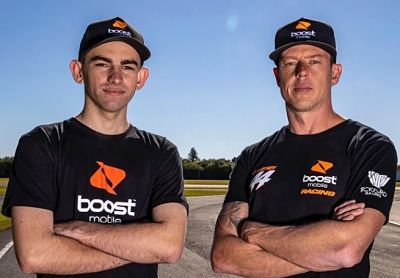Australian racing car driver James Courtney has achieved a hell of a lot during his career - from being crowned the Junior Karting World Champion to winning the Formula A title and an Australian Supercars Championship.
James also happens to have Precision Hydration in his bottles, so we caught up with the star of the Tickford Racing Team to find out why hydration is so important for motorsport drivers...
Hi James, this is your 16th season in the Aussie Supercars Championship, what's been the biggest change in how you train compared to the start of your career?
Well, I'm definitely taking my training a lot more seriously nowadays. I can’t just rely on my youthful energy to get me through anymore!
PH Founder Andy Blow has worked with the likes of Jenson Button and Mark Webber during his time as a Sports Scientist in Formula One and he often talks about how fit those guys were (and still are!). The fitness side of motorsport is obviously massive, so how do you balance your fitness training with actually spending time in the car?
As we're restricted to around 40 days of the year in the car we race, we have to come up with different ways of training specifically for racing but not in a race car.
As a sport, that’s pretty unique. Imagine a pro tennis player for instance only being allowed to practice on a court for 40 days a year and that should put things into perspective.
The gym-based sessions focus on functional movements through high intensity intervals, speed and reaction training, along with specific resistance routines.
Due to the high temperatures in the car when racing, all our sessions are done in rooms without air con as we don’t have those sort of luxuries in a Supercar. So, we'll be recreating what we'll be facing on race day.

That brings us nicely to our next question. Just how hot can it get in the cars?
It's between 55°C and 65°C (between 131°F and 149°F) degrees in the car, so it's pretty damn hot! As you can imagine, being in those temperatures for up to 3 hours at a time, hydration is everything.
It's another aspect of performance that I've learned and appreciated as I've grown older and more experienced as a driver. Over the last few years, I’ve realised how important hydration is and, without wishing to overdo the product plug here, Precision Hydration is easily the best I've used.
Very kind of you, James! And when it comes to preparing for race day, how to you mentally prepare for what you're about to face out on the course?
Phil Young at GP Human Performance plays a huge part in the preparation side of things. He looks after this by giving me little routines to fire up the brain and get the hand eye co-ordination sharp. We do some juggling and things like that.
When it comes to the day of the race, I just try to remain as calm as possible going into the race. I’ve trained hard and I have the ability, so now it’s about just going through the motions and getting the job done.
You've had some huge highs during your career, but there was the low of taking a year away from the sport to recover from a dreadful crash you endured at Monza in 2002 - what did you learn from that experience?
Surviving something like that shows how strong and safe the cars are. It definitely helped give me a sense of perspective and it can be difficult to remember that things will get better at the time.
For anyone going through tough times, it's worth remembering that the bad days always come to an end eventually.